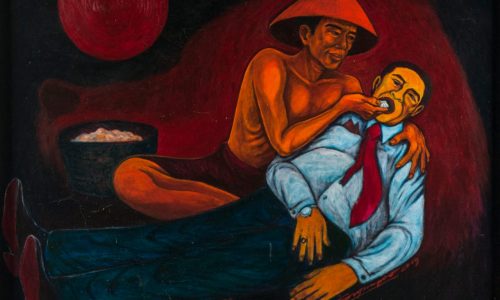Despite strong criticism that some articles of the revised criminal code (KUHP) bill are undemocratic and suppress freedom of expression, Indonesia’s House of Representatives (DPR) carries on its plan to deliberate the bill.
Lawmaker Arteria Dahlan of the House’s Commission III overseeing law, human rights and national security, said the commission would decide if they would deliberate the bill after the recess session in mid August 2022.
“Although it will be deliberated as soon as possible, we will not rush through the process since the House and government still have to discuss 14 crucial issues [regarding the criminal code bill],” he told Indonesia Business Post on July 13, 2022.
President Joko Widodo told media leaders that he would ask the Law and Human Rights Ministry not to rush the process. “They need to hear more aspirations from the public,” he said on July 13, 2022.
Dahlan said the government had just submitted the criminal code bill to Commission III on July 6, 2022. By distributing the draft law to all parties – including the public and those who requested it – the commission has shown its commitment to transparency in the deliberation process, he claimed.
“We have also distributed the draft law to factions in Commission III, and each faction is reviewing the bill. We will then appoint members to set up a working committee [on the criminal code bill] or any other required committees,” he added.
Lawmaker Rudy Mas’ud, also a Commission III member, said it was necessary to revise the Indonesian Criminal Code as it was a legacy from the Dutch colonial era.
The society must adapt to the judicial system in Indonesia as it develops. It can serve as a signal that the country has a criminal code that is consistent with the characteristics of the nation. The Criminal Code must be adapted to the principles of Pancasila, legal developments and society. The current Criminal Code is not in accordance with the times, he said.
“The Criminal Code must embrace a democratic, decolonization, harmonization and consolidation of the law based on modern law principles, as well as the use of restorative justice,” Mas’ud added.
Defamation articles
Indonesian civil society groups have criticized the articles of the revised criminal code bill.
According to Muhamad Isnur – the Indonesian Legal Aid Foundation (YLBHI) chairman and a member of the National Alliance of the Criminal Code Reform (KUHP Alliance) – several troublesome articles remain in the latest draft law of the criminal code.
The irrelevant return of the colonial articles may pose a problem to a democratic society. A good example would be Articles 218 and 220 of the criminal code bill dealing with the president and vice president’s defamation. Defamation of the president and vice president is a crime punishable by up to four and a half years in prison, as stipulateed in the article.
Unlike the existing Criminal Code, Article 220 of the revised draft law requires the president or vice president to file a written complaint to pursue a criminal case against the individual he believes has damaged his reputation.
A person who makes defamatory statements about the president is subject to prosecution by the National Police under existing laws, even if the president does not take any legal action. It is also the legal rights of any citizen to report to the police any defamatory statements directed against the president.
Article 218 of the Criminal Code stipulates that defamatory statements against the president can result in a prison sentence of three and a half years. However, the prison term can be extended by an additional year if the defamatory statements are spread on social media.
Defamatory statements can be made in verbal, writing, pictures or videos, “with an intent to make it public” under article 219 of the bill, and the maximum punishment is four and a half years or a specific amount of fine.
Insulting the president is punishable by six years in prison under the existing laws.
These articles on defamation, according to Isnur, stems from lese mejeste (the insulting of a monarch or other ruler), which is an attempt to protect the Dutch Queen, a legacy from the colonial era in Indonesia. In addition to the Constitutional Court annulling these articles on December 4, 2006, these articles also suppress the freedom of expression, information and legal certainty.
Articles 240 and 241 of the criminal code bill, which criminalizes defamatory remarks against the legitimate government, is also problematic. According to article 240 of the criminal code bill, persons who make defamatory remarks or insults against a legitimate government that cause unrest in the society and they are subject to a maximum punishment of three years or a specific fine.
According to article 241, anyone who broadcasts, shows, or embeds writings or images that the public can see, or disseminates information technology that contains insults to legitimate governments intending to make the insults known to the public, will be subject to the maximum penalty of four years in prison or a specific amount of fine.
Isnur said such articles were known as haatzaai artikelen, which are articles that prohibit the expression of hatred or discomfort towards the ruler.
“The articles were applied to Indonesians during the Dutch occupation. These are colonial laws that do not apply to an independent and democratic state,” he said.
The United Nations Covenant on Civil and Political Rights, number 34, point 38, stated that the government of a member country should not ban criticism of institutions, such as the military or state administration.
Freedom of assembly
Isnur pointed out another problematic article which was article 256 of the criminal code bill. This article stipulates that a person who, without prior notice, has the authority to hold parades, demonstrations and protests in public streets and public places that result in public disturbance, cause a commotion or chaos in the society is punishable with a full six years in prison of a specific amount of fine.
He believed the public interest element in the article was too “flexible” and is susceptible to misuse because the explanation section does not provide a clear definition of public interest. It is necessary to remove the piece since, following the Reform and the enforcement of Law No. 9/1998, a protest without notice can only be dispersed but not criminalized.
“According to article 361 of the criminal code bill, those who cause chaos in a crowd or group and refuse to disperse after three warnings from authorities can be penalized,” Isnur explained.
Privacy intrusion
In his opinion, article 415 of the criminal code bill is also troublesome. This article stipulates that a person who has sexual relations with a person who is not her husband or wife has been convicted of adultery and may serve a maximum sentence of one year in prison or pay a specific fine. Also, according to this article, the prosecution will not be instituted except on the complaint of a spouse for a person bound by marriage or a parent or a child for a person not bound by marriage.
Isnur believes the state has used criminal code to intrude too far into the privacy of its citizens. Parental complaints regarding the sexual intercourse of their children may increase the number of child marriages in Indonesia. Approximately 89 percent of child marriages are due to the parents’ concerns that their children have engaged in sex before marriage and economic factors.
“As a result of criminalizing sex before marriage, including sexual intercourse with sex workers, there is a risk that those engaging in sexual intercourse will not have access to health services and HIV/AIDS cases are likely to increase,” he said. He added that based on estimates, there are approximately five million men in Indonesia who engage in sex before marriage and extramarital sex.
Additionally, there are other problematic articles in the criminal code bill, which include criminalizing same-sex sexual relations, abortion, condom campaigns, treason, and contempt of court.
Denial
Despite the arguments, lawmaker Dahlan denied that the criminal code bill is a legacy of colonialism. He said that criminal codes worldwide were similar. In other words, the criminal code has a universal characteristic regarding its material and norms. Political crime, defamation and morality are the only differences.
“We are developing the criminal code with Indonesian characteristics. We will include the one we believe is most appropriate in the law,” he said.
“Unfortunately, we are destined to have a criminal code that dates back to the colonial era. Are there any options available to us? We had a Dutch-made criminal code since when I was born. However, this does not imply that we are using colonial content by using some of the materials and contents from the previous criminal code. Based on the current situation, we are creating a new criminal code,” he added.
According to Dahlan, a former activist himself, none of the articles will restrict the rights of the citizens, including students, to voice their opinions in a public forum.
Mas’ud explained that the purpose of article 415 criminalizing sex before marriage or extramarital sex is to protect the public interest by enforcing the norm and public order, including morality and social norms. In his view, there should be a general discussion on the controversial articles’ goals.
“To address the need for a law for the people, I hope they [those involve in the deliberation process] will prioritize the interests of the people without being swayed by other interests,” he said.
House’s Commission III member Johan Budi said the allegation that specific criminal code bill articles were undemocratic remained debatable.
“Not all people share the same opinion. The bill will be discussed between the government and the House. There are nine factions of political parties in the House and each faction has its viewpoint,” he concluded.
Although the House wants to pass the criminal code bill into law as soon as possible, Budi indicated that commission III would still welcome inputs and opinions from civil society groups.









